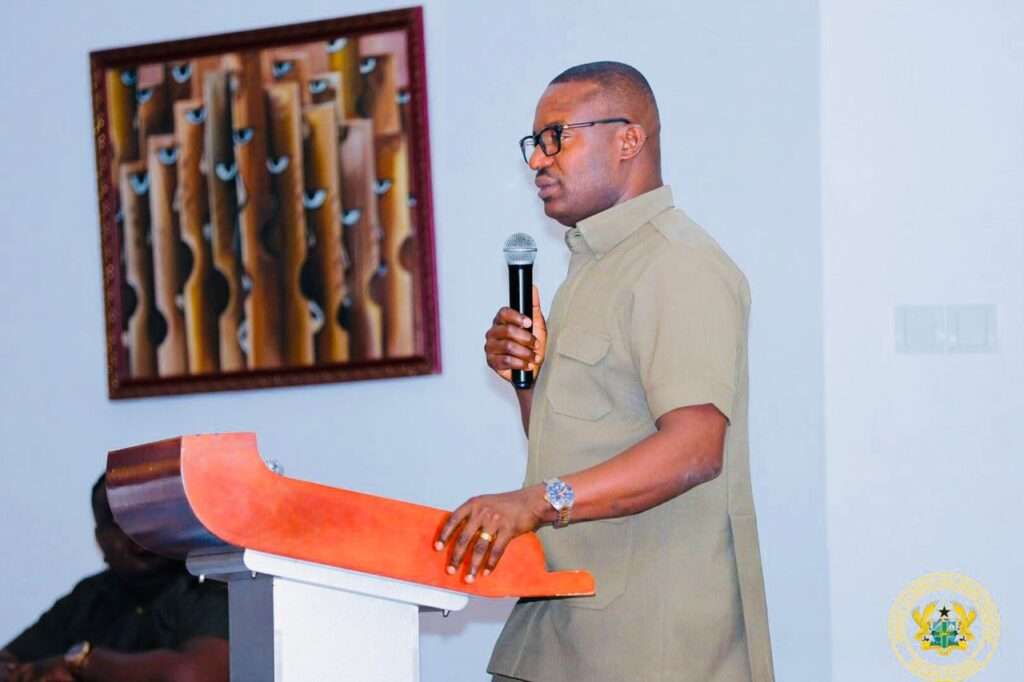The Minister for Energy and Green Transition, John Abdulai Jinapor, has urged Ghanaians to exercise patience in the face of potential power supply disruptions, attributing the situation to the country’s lack of spare capacity and ongoing financial constraints.
His call for understanding comes as the government struggles to settle a $75 million debt owed to N-Gas Limited, a critical supplier of gas for Ghana’s power generation.
Jinapor made these remarks during a working visit to the West African Gas Pipeline Company (WAPCo) Station in Tema on February 21, where he acknowledged the urgency of addressing the debt crisis while ensuring minimal disruption to electricity supply.
“This is an outstanding liability from all the gas they have supplied. It has to do with liabilities from last year [2024] up to now. It’s about $75 million.
“Given the tight fiscal situation, we want to appeal to our Nigerian counterparts that if we can make a down payment while they give us some payment schedule.”
John Abdulai Jinapor, Minister for Energy and Green Transition
The outstanding debt of $75 million owed to N-Gas Limited has raised concerns about potential disruptions in power generation.
N-Gas, which supplies gas through the West African Gas Pipeline, has officially notified the Volta River Authority (VRA) of its intention to suspend gas supply unless the arrears are cleared.

This development places Ghana’s power sector in a precarious position, given the country’s heavy reliance on gas-fired power plants for electricity generation.
The minister reassured the public that President John Dramani Mahama, along with Finance Minister Dr. Cassiel Ato Forson, is actively working to mobilize resources to settle part of the debt.
“Mr. President met with the finance minister, myself, and it thus appears that the finance minister would be able to mobilize some resources.
“The truth is that given the situation we find ourselves in, it will be difficult to make the entire amount at a go.”
John Abdulai Jinapor, Minister for Energy and Green Transition
Potential Impact on Power Supply

The looming suspension of gas supply by N-Gas threatens to exacerbate Ghana’s electricity supply challenges.
The country’s power sector is already grappling with an insufficient generation reserve margin, making it vulnerable to unexpected shortages and maintenance-related disruptions.
Jinapor acknowledged the risk but assured the public that contingency measures were being explored to mitigate the impact.
“Let me appeal to Ghanaians that if they see some minimum disruption in the power supply, it’s not deliberate.
“Just that given the situation and the short time period we had to scramble to procure fuel, we’re trying our very best to ensure that there’s very minimal impact.”
John Abdulai Jinapor, Minister for Energy and Green Transition
The Minister also commended the Ghana Grid Company (GRIDCo) and all power producers for their continued efforts in maintaining stability within the system.
He further urged the Electricity Company of Ghana (ECG) to remain on high alert to address any unforeseen challenges swiftly.
Ghana’s current predicament underscores broader financial and structural challenges within the energy sector.
Over the years, the country has accumulated significant debts in the power sector, largely due to inefficiencies in revenue collection, high operational costs, and subsidies that strain government finances.
The situation has been further compounded by delays in payments to Independent Power Producers (IPPs) and gas suppliers.
The debt owed to N-Gas is part of a larger problem of outstanding obligations to various entities in the energy value chain, which threatens the sustainability of Ghana’s electricity supply.
Despite the difficulties, Jinapor remains optimistic that a resolution will be reached through negotiations with N-Gas.
“I’m sure that our Nigerian counterparts are very cooperative. No matter the challenge, I’m sure we will be able to find a solution.”
John Abdulai Jinapor, Minister for Energy and Green Transition
The current debt crisis highlights the urgent need for long-term financial sustainability in Ghana’s power sector.
While the government’s immediate focus is on resolving the N-Gas debt issue, broader reforms will be necessary to ensure stable and reliable electricity supply in the long run. As negotiations continue, Ghanaians will be watching closely to see how the government navigates this critical challenge.



















